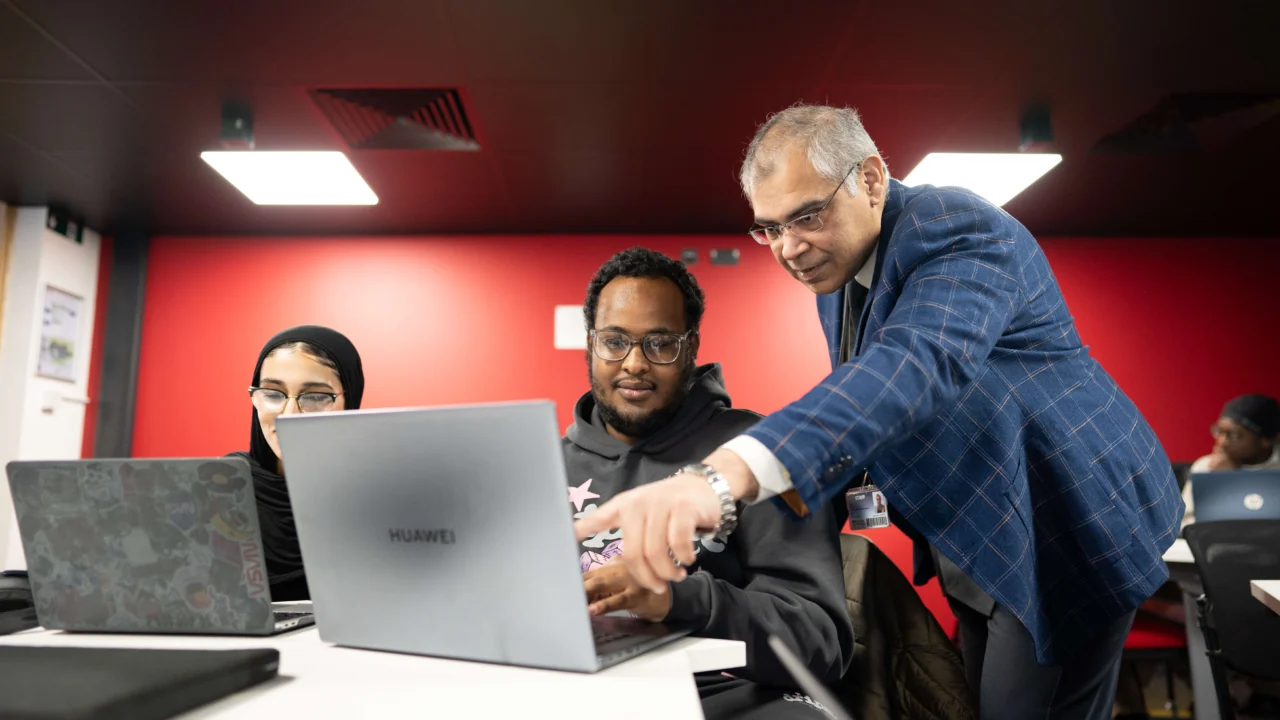MSc Computer Science (conversion)
Postgraduate
- Start date
- –
- Study mode
- –
- Course length
- –
- UCAS Code
- –

Interested in a different start date?
Discover how creativity, technical skill and ethical awareness can help you thrive in the digital world. The MSc Computer Science (Conversion) at Birmingham Newman University is designed to empower graduates from non-computing backgrounds to transition into the dynamic world of technology. Whether you are seeking a career change or expanding your professional toolkit, the course offers a clear and accessible route into computing. With a curriculum shaped by current industry needs, you will build a strong foundation in programming, software development, databases, web technologies, networks, artificial intelligence and data science.
Book a free consultation
Want to find out more about your options? Book a free consultation with an Academic
Why Study This Course?
The MSc Computer Science (Conversion) at Birmingham Newman University offers an inclusive and empowering pathway into computing for graduates from non-technical backgrounds. Whether you are looking to change direction or enhance your career prospects, the course equips you with the technical knowledge, analytical skills and confidence to thrive in a fast-moving industry. Rooted in ethical practice and real-world relevance, the programme prepares you to respond to technological challenges with clarity and creativity.
Explore the Realities of Computing in Practice.
You will engage with key areas such as programming, software development, databases, networks, artificial intelligence and data science. The course encourages you to think critically, apply problem-solving strategies and reflect on how technology shapes, and is shaped by, society. With a strong focus on applied learning, you will connect theory to practice and build the skills needed to work professionally across a range of computing roles. Each module is designed to support your transition into the field with confidence.
Supportive and Personalised Learning.
At Birmingham Newman University, you will be part of a collaborative and inclusive academic community that values your individuality and supports your growth. The course is taught by experienced lecturers and industry-informed practitioners who are passionate about computing and committed to your success. With small class sizes and regular feedback, you will be encouraged to explore your potential in a respectful and empowering environment. Whether you are writing your first line of code or preparing for your final dissertation, you will be supported every step of the way.
Complimentary Surface Pro
All Computer Science students set to start in 2026 will receive a Surface Pro laptop. This will be automatically loaned to you for the entire duration of your course. This exclusive, dedicated device is yours to support your studies from day one.
Complimentary Surface Pro
All Computer Science students set to start in 2026 will receive a Surface Pro laptop.
This will be automatically loaned to you for the entire duration of your course. This exclusive, dedicated device is yours to support your studies from day one.

Got a question you’d like to ask?
Entry requirements
We welcome students from all backgrounds and accept a wide range of qualifications. If yours aren’t listed, don’t worry – our Admissions Team can help you explore your options. See full entry requirements.
A relevant honours degree, 2:2 or above.
If English is not your first language, you must have an IELTS score of 6.5, with no element below 6.0. (Other English language qualifications are also accepted. Please contact admissions for further information).
Consideration will be given to applicants with lower grade in qualifications (e.g. a 3rd class degree or non-honours degree) who have a relevant range of post study professional experience. Professional experience will be considered by the programme leader in conjunction with the quality office on an individual basis.
Please contact Admissions if you have any questions.
Course fees
The tuition fee for academic year 2026/27 is: £10,250. Tuition fees for courses starting April to May 2026, fall within the 2025/26 academic cycle.
Fees for the 2025/26 academic year can be found on our Student Finance pages.
Additional costs
The University will review tuition fees and increase fees in line with any inflationary uplift as determined by the UK Government, if permitted by law or government policy, in subsequent years of your course. It is anticipated that such increases would be linked to RPI (the Retail Price Index excluding mortgage interest payments).
Computer Science News

Andrew Csizmadia Named Fellow of the British Computer Society for Excellence in Computing Education
Andrew Csizmadia SFHEA, Emeritus Fellow in Computing Education at Birmingham Newman University, has been appointed…

Book an open day
Find out about our next open day. Book now to secure your place.
Our Careers team provides tailored advice, placements and workshops to help you build confidence and prepare for life after university.

Where This Course Can Take You. Graduates of this programme are well prepared to pursue careers in software engineering, data analysis, cybersecurity, systems architecture and beyond. The course also provides a strong foundation for further academic research, including progression to PhD-level study. With its focus on ethical practice, applied learning and technical confidence, the MSc Computer Science (Conversion) equips you to contribute meaningfully to the tech sector. You will graduate with the ability to lead, innovate and make a positive impact in a rapidly evolving digital landscape.
Accreditations and Exemptions
The MSc Computer Science (Conversion) is grounded in the values of ethical practice, technical rigour and applied learning. While it is not formally accredited by a professional computing body, the course has been developed in line with current academic and industry standards. It introduces you to the expectations and responsibilities of computing professionals and provides a strong foundation for further training or certification. Many students go on to work in software development, cybersecurity, data analysis and IT consultancy, or continue into postgraduate research. The skills and insight you gain can also support your development in roles involving innovation, digital strategy and systems design across a wide range of sectors.




